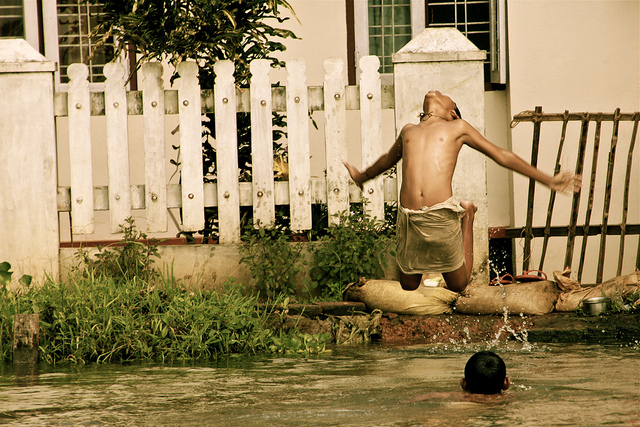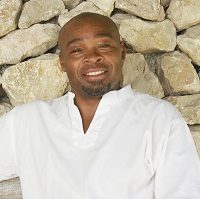“I am the Self who dwells in the Heart of all beings. I am the beginning, the middle and, indeed, the end of all beings.” ~ Sri Ramana Maharshi, The Essence of the Bhagavad Gita.
~
There was once a young boy who loved to swim.
Every day after school he would ride his bicycle to the river and dive deep into its coolness.
One summer’s day he told his father he was going to ride to the river. His father, a wise man, said to him, mildly, “My son, your intention is a projection into the future.”
“Yes,” said the boy, and in a moment of clarity he replied, “Any intention must be so.”
And his father smiled at him. “Then go,” he said, “enjoy the water, and be safe on the road.”
As the boy rode his bicycle along the dirt road it dawned on him that the skill of riding was also a projection, but into the past. He realised then that any learned skill must be so. More than that, he and his bicycle were moving through the present moment that itself was moving both forward into the future and back into the past.
And it was all happening Now.
The boy had learned the route to the river from his father years ago. Riding along it with the heat of the summer sun on his back, it became apparent to him that recollection—his memory of the past—was continually being brought into the present moment. How else could he know the way to the river?
And as he rode, in his anticipation of turning left at the almond tree and right at the vineyard he was projecting ahead, into the future, bringing what lay ahead into the present moving moment as well. He realised that any anticipation was also a projection into the future and must be so.
Just before the left turn at the almond tree a wild cat leapt across his path. The boy swerved but kept his balance. The cat swerved but kept her balance, naturally.
A smile spread across his face at the revelation brought by this encounter—his concentration in the present moment had averted an accident and yet, all the while, he was accessing the past and the future. It was about balance.
And so he reached the river, stripped naked and dived in submerging deep into the quiet, cool waters. It occurred to him then that the river—like himself, like his bicycle—flowed freely within all aspects of time, without preference or prejudice.
Its past—the mountain spring—was connected by the same body of water that he swam in Now. Its future—the estuary entering the ocean—was connected by the same body of water that he swam in Now—the present moving moment.
And all was One.
There was no separation in the water—no preference, no attachment to one aspect of it over another. Submerged and weightless in its flow, he felt alive, and free.
The summers passed by and the boy grew older and became a man. Year by year he forgot this wonderful freedom in time that he had once felt. His friends, his teachers, even complete strangers would tell him,
“The past is gone, you can never change it—do not give it much thought. The future will happen some other time, but not Now. All you have is the present moment.”
He slowly but steadily forgot his freedom and began to live by this new creed.
Many years later he took a journey to mother India, seeking something he had lost—he knew not what. On the road one day he met a smiling sadhu, who, apart from his naked, ash-covered body, reminded him a little of his father.
“My son,” said the holy man, “where are you?”
Thinking this was some kind of test and keen to appear insightful and spiritual , he replied, “I am in the Now.”
“No,” said the sadhu, “you cling to the present moment, like a rock in the river—stuck in the mud, mentally fixed, physically unbending, spiritually unmoved. And all the while Now flows around you free, instead of through you. Why not let go of your attachment to the present moment and flow to the sea?”
Then the man remembered the boy he was, his bicycle, the summer and the river he swam in.
In that moment he let go, remembering what it had felt like to be truly free.
The sadhu smiled.
“Now go,” he said, “enjoy the water, and be careful on the road.”
~
“Let go of the past,
Let go of the future,
Let go of the present,
Proceed to the opposite shore with a free mind.
Leaving behind all conditioned things,
You shall no more fall into birth and decay.” ~ The Buddha, from the Dhammapada
“Learn from yesterday, live for today, hope for tomorrow. The important thing is not to stop questioning.”
~ Albert Einstein
~
Relephant:
The Practice that led to the Buddha’s Attainment of Enlightenment.
Author: Arun Eden-Lewis
Editor: Khara-Jade Warren
Image: Pepe Pont/ Flickr



Read 2 comments and reply